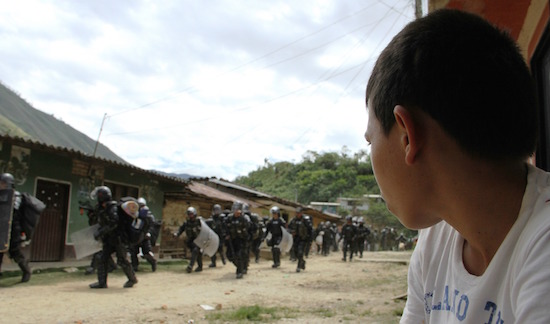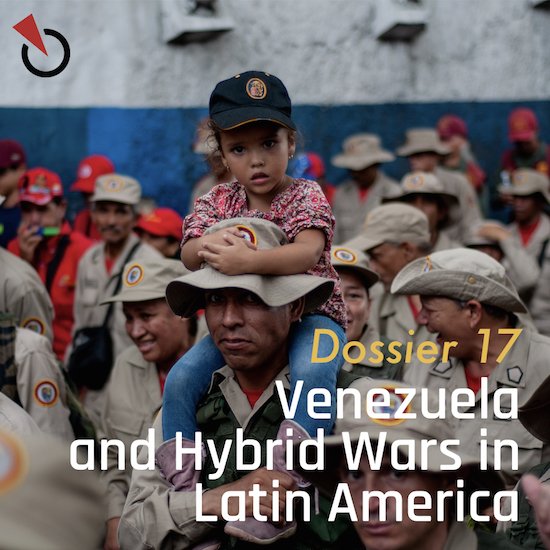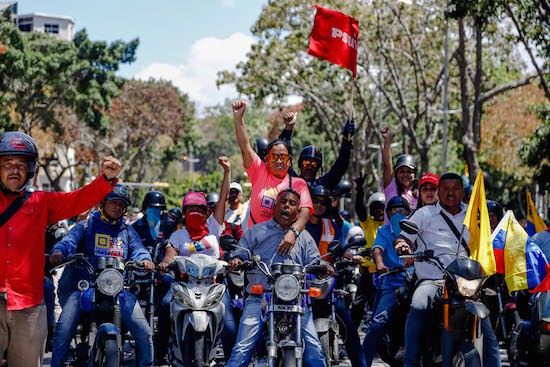U.S. and Allies Wage ‘Hybrid War’ against Venezuela
ANGLO AMERICA, LATIN AMERICA AND THE CARIBBEAN, 10 Jun 2019
Tricontinental Institute for Social Research – TRANSCEND Media Service
6 Jun 2019 – Venezuela and the Bolivarian Revolution have become a central focus of the neoliberal and imperial offensive that is unfolding in Latin America. At the center of this offensive is a strategy of hybrid warfare that aims at exploiting the political, military, and economic weaknesses and limits of governments considered to be hostile to a world order driven by the interests of global capital. These interventions seek to ensure not only the control of common goods but also control over their markets, the main commercial routes (via land, rivers, and seas), the transportation routes of these goods (oil, mineral, and gas pipelines), the generation and supply of energy, and even the population that inhabits these areas, in order to support the interests of global capital.
The immense oil reserves located in Venezuela place it in a strategic position in Latin America and at the crux of global geopolitical disputes. In addition to oil, Venezuela has large deposits of gold, nickel, iron, and diamonds that have piqued the interest of China, Russia, and—of course—the United States and Canada (the latter two of which play a leading role in the Lima Group, a network of countries that came together in 2017 with the express purpose of regime change in Venezuela).
The hybrid wars waged by imperialist interests to undermine governments that challenge their interests have a wide range of characteristics—among them, economic and financial asphyxiation, economic destabilization, diplomatic and media blockades, the instigation of internal violence, the generation of chaos by attacking essential services, and pressures attempting to create institutional fractures or a coup d’état, and even the threat of military intervention.
Tricontinental: Institute for Social Research’s seventeenth DOSSIER, “Venezuela and Hybrid Wars in Latin America,” discusses the various dimensions of the hybrid war that is currently being unleashed against Venezuela and across Latin America—from Colombia to Haiti—as well as the reasons motivating it.
Tricontinental: Institute for Social Research launches new DOSSIER, “Venezuela and Hybrid Wars in Latin America”
“Venezuela’s political reality and its planners, intellectuals, and supporters are deeply impacted by the actions of the White House. But the White House is not the same as it was under Reagan. We are not talking about the empire in its hyper-hegemonic phase, but rather about an empire in decline. In the face of this reality, the Chavista revolution has had to learn how to confront these kinds of coups. If we had to write a ‘counter-manual’ of hybrid wars, Venezuela is doing this in its own way, as is Colombia. We have seen this throughout the last year as the coup attempts have unfolded.” —William Serafino, Chief Editor of Misión Verdad
“Our seventeenth is one of our richest studies of the mechanisms of power in our time. A hybrid war is not fought necessarily on a battlefield, with conventional armies. It is an ideological war, a war to shape the way reality is seen, a war of position to define what is happening that leads eventually to a war of manoeuvre to overthrow a government.” —Vijay Prashad, Executive Director of Tricontinental: Institute for Social Research
Key information from the report:
- Since the initiation of the Bolivarian Revolution under Chávez, when Venezuela assumed a leading role in building an alternative project that challenges U.S. imperialism, the country has been the terrain of a major battle waged by interests of global capital and championed by the United States.
- Venezuela is not only the world’s largest supplier of oil; it is also home to a large section of the Amazon region as well as deposits of gold, nickel, iron, and diamond.
- Foreign intervention in Venezuela’s economy has been a key strategy to attempt to generate instability and discontent among the Venezuelan people. This strategy existed under Chávez and has increased under Maduro’s government. These tactics include increasing control over foreign investment, promoting capital flight and currency speculation, implementing trade barriers, and creating shortages of essential goods.
- The promotion of violence and chaos in Venezuela has been a recurrent strategy in the attempts to destabilize the Bolivarian Revolution and create conditions that would justify a coup and foreign intervention with the participation of neighboring states such as Colombia, Guyana, and Brazil.
- Actions of the opposition to create cycles of road blockades (guarimbas) and hate crimes, incite looting and targeted assassinations, portray Venezuela as the most violent country in Latin America, sabotage electricity grids, and encourage violence perpetrated by parastatal groups—among other tactics—have created an image of Venezuela as insecure and violent that has been further reinforced by corporate media.
- An information blockade generated by international corporate media seeks to shape public opinion while withholding key facts and perspectives on the reality on the ground. This perspective supports the right-wing understanding of Venezuela and other countries under siege by hybrid wars.
- It is impossible to militarily intervene in a country unless public opinion is disposed to the intervention. If world opinion is shaped to see the government as a criminal entity, then war becomes acceptable—perhaps even necessary.
- Humanitarian aid and multilateral interventions have played a key role in the current strategy of capital and imperialism, a strategy that is particularly evident in the case of Haiti. Humanitarian aid has served as an avenue of re-colonization, beginning by dehumanizing the country and its people, which it portrays to be incapable of managing itself autonomously despite the fact that the challenges experienced by the state are the very result of imperialist actions. The weakened state is then replaced by international NGOs who exercise control over basic state functions.

El Mango Village in the town of Argelia, Department of Cauca, Colombia. Courtesy of Marcha Patriótica
________________________________________________
Tricontinental: Institute for Social Research is an international, movement-driven institution that carries out empirically based research guided by political movements. They seek to bridge gaps in knowledge about the political economy as well as social hierarchy that will facilitate the work of their political movements and involve themselves in the “battle of ideas” to fight against the bourgeois ideology that has swept through intellectual institutions from the academy to the media.
All of their materials are produced in English, Spanish, Portuguese, and French.
Tags: Chavismo, Conflict, Coup, Economics, Fake News, Journalism, Latin America Caribbean, Maduro, Media, Oil, Politics, Power, Sanctions, USA, Venezuela, Violence
DISCLAIMER: The statements, views and opinions expressed in pieces republished here are solely those of the authors and do not necessarily represent those of TMS. In accordance with title 17 U.S.C. section 107, this material is distributed without profit to those who have expressed a prior interest in receiving the included information for research and educational purposes. TMS has no affiliation whatsoever with the originator of this article nor is TMS endorsed or sponsored by the originator. “GO TO ORIGINAL” links are provided as a convenience to our readers and allow for verification of authenticity. However, as originating pages are often updated by their originating host sites, the versions posted may not match the versions our readers view when clicking the “GO TO ORIGINAL” links. This site contains copyrighted material the use of which has not always been specifically authorized by the copyright owner. We are making such material available in our efforts to advance understanding of environmental, political, human rights, economic, democracy, scientific, and social justice issues, etc. We believe this constitutes a ‘fair use’ of any such copyrighted material as provided for in section 107 of the US Copyright Law. In accordance with Title 17 U.S.C. Section 107, the material on this site is distributed without profit to those who have expressed a prior interest in receiving the included information for research and educational purposes. For more information go to: http://www.law.cornell.edu/uscode/17/107.shtml. If you wish to use copyrighted material from this site for purposes of your own that go beyond ‘fair use’, you must obtain permission from the copyright owner.
Read more
Click here to go to the current weekly digest or pick another article:
ANGLO AMERICA:
- Washington Green-Lights $30M for Gaza Aid Scheme Tied to Mass Killings of Palestinians
- War with Iran: We Are Opening Pandora's Box
- Trump’s Useful Idiots
LATIN AMERICA AND THE CARIBBEAN:

